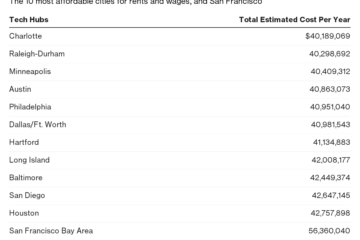Conditions Are Ripe for an Exodus From Big Cities: Conor Sen

published Sep 2nd 2016, 12:46 pm, by Conor Sen
(Bloomberg View) —
The stock market of the late 1990s is remembered mostly for high-flying dotcom equities that eventually crashed back to earth. Yet from a money flows standpoint, the bigger imbalance of that era was that large-cap stocks fetched very high valuations relative to small-cap stocks. This market opportunity was exploited by hedge funds, leading to a decade of outperformance and huge growth in the industry. In many ways, the national housing market is similarly positioned today.
A Trulia article this week showed that home values in the most expensive U.S. metro areas have diverged sharply from those in the rest of the country over the past 30 years. Not only have incomes grown the fastest in West Coast cities such as San Francisco, San Jose and Seattle, but natural and political constraints have made it difficult to increase housing supply, leading to even faster home price growth. At the other end of the spectrum, in the South and the Midwest, lower income growth combined with fewer constraints on increasing the housing supply has led to more muted home price gains.
What about the future? It’s likely that the experience of the stock market from the late 1990s through the next decade, when valuations of large-cap stock and small-cap stocks ended up converging, will be replicated in the housing market. The first reason is simple math: It may make sense for the value of housing in desirable metro areas such as San Francisco and Los Angeles to exceed the value of housing in less-desirable areas such as San Antonio and Phoenix: There’s a limit to everything. Substitution dynamics — consumers weighing the value of various goods — applies to housing just as much as it does to food.
The second reason is job mobility. The conventional wisdom that the internet would allow people and jobs to leave primary metro areas for secondary ones has run up against the fact that over the past 20 years the opposite has occurred. There are a few problems with this argument. First, at the height of the last housing boom the impact of the internet on daily lives was still quite small. The only people with smartphones were business users who had BlackBerrys. Cloud technology was still in its infancy. For most people, the internet was still a desktop-computer- and email-based experience. Now, with a labor market approaching full employment and the housing market nearing a normal recovery, it would be fair to evaluate the question of whether people will move. And the evidence suggests they will. The latest Case-Shiller home price report shows that Portland and Seattle have the fastest home price growth in the country, benefiting from Bay Area transplants. Additionally, Sun Belt metros such as Dallas, Tampa and Miami now have faster home price growth than San Francisco or Los Angeles.
A look at the history of the last transformative technology in the U.S., the automobile, offers another counterargument to those who believe that the internet won’t lead to mobility away from the top metro areas. The Model T Ford was produced between 1908 and 1927. Yet the Interstate Highway System was not approved by Congress until almost 30 years later, and the Sun Belt boom occurred even after that. The automobile was a revolutionary technology incubated in Detroit, but its biggest beneficiaries were the suburbs in Atlanta, Houston, Dallas and the Southwest. There’s no reason to think the internet will evolve differently.
In a way, the large city clustering was more about a poor national job market and risk aversion than anything. Between the decline of manufacturing employment and job outsourcing, stagnant incomes and volatile economic cycles, workers got scared and moved to where the job clusters were, in large global cities. Employers and company executives exploited this. Investors behave in a similar way, selling their speculative stocks in times of trouble and buying defensive ones instead. Now, with workers gaining bargaining power over their employers for the first time in years, the big-city exodus can begin.
This column does not necessarily reflect the opinion of the editorial board or Bloomberg LP and its owners.
To contact the author of this story: Conor Sen at conor@newriverinvestments.comTo contact the editor responsible for this story: Max Berley at mberley@bloomberg.net
For more columns from Bloomberg View, visit Bloomberg view
copyright
© 2016 Bloomberg L.P







No Comment